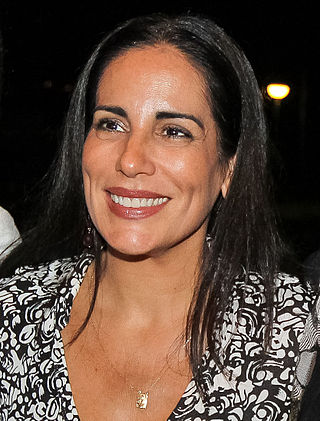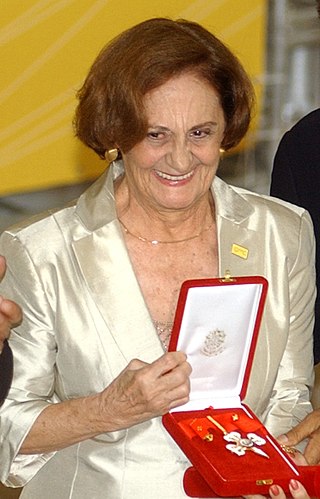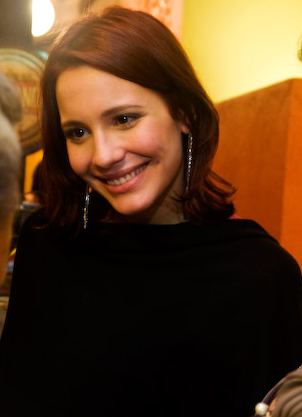Related Research Articles

Sônia Maria Campos Braga is a Brazilian actress. She is known in the English-speaking world for her Golden Globe Award–nominated performances in Kiss of the Spider Woman (1985) and Moon over Parador (1988). She also received a BAFTA Award nomination in 1981 for Dona Flor and Her Two Husbands. For the 1994 television film The Burning Season, she was nominated for an Emmy Award and a third Golden Globe Award. Her other television and film credits include The Cosby Show (1986), Sex and the City (2001), American Family (2002), Alias (2005), Aquarius (2016), Bacurau (2019), and Fatima (2020). In 2020, The New York Times ranked her #24 in its list of the 25 Greatest Actors of the 21st Century.

Glória Maria Cláudia Pires de Morais is a Brazilian actress. She is best known for her roles in TV Globo telenovelas such as Dancin' Days, Vale Tudo, Mulheres de Areia and O Rei do Gado. She is also known for starring in films such as Academy Award-nominated O Quatrilho, box-office hit If I Were You and its sequel, and Lula, Son of Brazil, which is the second most expensive Brazilian film of all time, after Nosso Lar.

Letícia Birkheuer is a Brazilian model and actress.

Laura Cardoso, artistic name of Laurinda de Jesus Cardoso Balleroni OMC is a Brazilian actress. She is celebrated as one of the best and most well known Brazilian actresses of cinema, theater and television.
Carmen Silva, who was often credited as Carmem Silva, was a Brazilian television, stage and film actress. She was best known in recent years for her role on the Brazilian telenovela, Mulheres Apaixonadas in which she played Flora de Souza Duarte, the wife of Leopoldo Duarte. Mulheres Apaixonadas was created by Manoel Carlos.

Yara da Silva Amaral was a Brazilian actress.

Leandra Rodrigues Leal Braz e Silva is a Brazilian actress, singer, film director, producer, and playwright.
The Brazilian telenovela, the most popular form of teledramaturgy in Brazil, has been produced and aired in the country since the 1950s. Sua Vida Me Pertence, written and directed by Walter Forster and shown on the now-defunct TV Tupi São Paulo between December 21, 1951 and February 15, 1952, was the world's first telenovela. According to Keske & Scherer, telenovelas have held the "status of the most profitable product in the Brazilian cultural industry" since the mid-1970s.

Mônica Rodrigues Carvalho is a Brazilian actress and former model.

Juliana Knust Sampaio is a Brazilian actress.

Bianca de Souza Mendes Comparato is a Brazilian actress. She has starred in Como Esquecer in 2010, as well as A Menina sem Qualidades and Somos tão Jovens, both in 2013, the latter for which she won the Grande Prêmio do Cinema Brasileiro as Best Supporting Actress for her role of Carmem Teresa. In 2016, she starred in the Netflix series 3%, gaining international attention and acclaim for her portrayal of the series' character, Michele.

Isabelle Christine Lourenço Gomes Drummond is a Brazilian actress, businesswoman and philanthropist. She became known as a child when she played the rag doll Emília in the children's series Sítio do Picapau Amarelo, joining the cast for six consecutive years.

Maria Fernanda Cândido is a Brazilian actress, television presenter, and former model.

Marisol Ribeiro is a Brazilian actress.

Helena Ranaldi Nogueira is a Brazilian actress.

Bruna Reis Maia, known professionally as Bruna Marquezine, is a Brazilian actress, filmmaker, and model. She debuted on television in 2000 as one of the children interviewers for the children's program Gente Inocente. She has been part of the cast of several telenovelas. Throughout her career, she has been awarded the Troféu Imprensa, Contigo Award! 2004, and Young Brazilian Award, among others. She plays Jenny Kord, a love interest for Jaime Reyes in the DC Universe film Blue Beetle (2023).
Simone Zucato is an actress, theater producer, translator and medical doctor.

Ada Chaseliov was a Brazilian film, stage, and television actress.
Vera Nunes, stage name of Isaura Nunes Martins Henriques, was a Brazilian actress.

Ida Gomes, stage name of Ita Szafran was a Polish–born Brazilian actress.
References
- 1 2 3 4 "Dorinha Duval". O Globo. Retrieved 14 September 2021.
- 1 2 3 4 "Biografia tira Dorinha Duval da sombra". Folha de S. Paulo. Retrieved 14 September 2021.
- 1 2 3 4 "Por Onde Anda? A atriz Dorinha Duval". Memórias Cinematográficas. Retrieved 14 September 2021.
- 1 2 3 4 "A ATRIZ BRASILEIRA QUE MATOU O PRÓPRIO MARIDO: O QUE ACONTECEU COM DORINHA DUVAL?". Aventuras na História. 22 December 2020. Retrieved 14 September 2021.